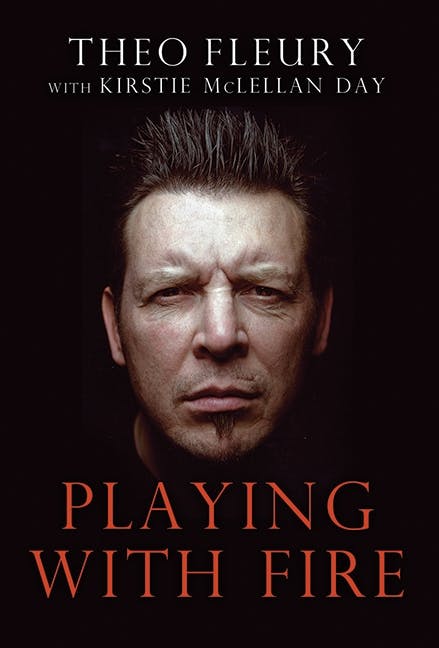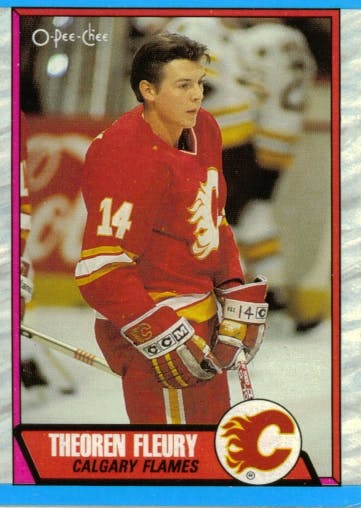AROUND THE LEAGUE: WEEK THREE
By Jason Gregor
13 years ago
The game many of us grew up playing or watching will once again have to face one of its deepest and darkest secrets now that Graham James is back in Canada. This time around, I hope the hockey world embraces the victims and sets the stage for other victims to come forward because the hockey world will support them too.
THE ARREST
Early Wednesday morning at the Pearson International airport in Toronto, James, the convicted sex offender and former WHL coach and Hockey News man of the year, was arrested by members of the Winnipeg Police Service. On October 13th, Winnipeg police issued a warrant for James’ arrest in connection with charges of sexual assault and other life-ruining acts involving three complainants, one of which is former NHLer Theo Fleury.
When the warrant was originally issued I wondered if James would have the guts to “Man Up“ and do the right thing. He was living in Mexico and had he chose to stay there it would have taken years to extradite him back to Canada. He could have remained in hiding and never faced the music, which based on his past history is what I thought he would do. I applaud him for returning to Canada to face his charges and finally doing the right thing.
Sexual assualt or abuse is still very much a taboo topic in society and maybe even more in hockey. Hockey, and in fact most sports, have always tried to maintain an image of toughness filled with lots of bravado and machismo. Showing weakness was, and sometimes still is, frowned upon. Unfortunately history shows that in hockey and in real life turning a blind eye to allegations or rumours of sexual abuse is the norm.
In 1996, James was arrested and charged with sexual assault against two minors. Former NHLer, Sheldon Kennedy was one of them while the other chose to remain anonymous. James plead guilty in 1997 and was sentanced to three and a half years in jail.At the time of his conviction he admitted to over 350 sexual encounters with the boys.
In 2009, it was revealed that two years earlier James was actually quietly given a pardon by the Justice System. I don’t want to focus on how someone could have allowed that to happen, but the Federal Government has since said it would crack down on pardons to avoid similar situations.
The James case will re-open wounds for the victims, but unfortunately many of us prefer not to hear or read about. When James was charged in 1996 many people around him didn’t believe it. They thought James, who used to be a teacher, was a great guy.
I wonder if some choose not to believe it, because they’d rather just not deal with it?
It must be very disappointing that many Canadians don’t want to deal with this type of abuse and are more apt to look the other way, And yet the victims, who have already suffered tremendously are forced to find the strength and courage to face their demons head on and in this case in front of the media spotlight.
THEO FLEURY

Theo Fleury has recently released a best selling book about his abuse at the hands of James and has become a spokesperson for sexual abuse.
I had Fleury on my show and asked him to explain why it took him so long to finally be able to talk about his past.
"I really needed to be ready to do this so it would have the biggest impact. I don’t think it was in people’s best interest to see a guy in front of reporters or talking about it in documentaries who was still broken and still breaking down and upset about what happened to him in his life. I needed to be a position of strength. I needed to be in a position where I had taken back my own power, and I think the honesty in which the book was presented reflected that."
Unfortunately many in the public don’t want to hear about sexual abuse cases. We all too often turn a blind eye and the statistics show that there are severe consequences for the victims who come forward – especially males and especially in sports.
All too often people make insensitive comments like, "If he didn’t like it he would have stopped it," without thinking that no one in their right mind would want to have their innocence and soul taken away. This not only discourages victims of sexual abuse to come forward, but it also creates a culture of secrecy that allows predators like Graham James to continue to commit their horrific crimes.
I have never been assaulted, so I can’t truly understand how it would impact one’s life and what they must go through on a day to day basis afterwards. I have however talked with many who have. The saddest part is that in most cases the reaction they receive when the unveil what happened is just as hurtful and damaging as the original abuse.
THE IMPACT ON HOCKEY

It goes without saying that hockey is more than just our national pastime here in Canada.
I don’t think there is anything that unifies our nation more than our love of the sport, and that is why the hockey world needs to be front and centre in the James case. Fleury told me that during many of his book signings, many males would come up to him say thank you and then lean in close and whisper to him, "I’ve been there too man."
How has Fleury’s life changed now that he has come forward?
"I’m now a very strong advocate for sexual abuse and sexual violence. There are lots of kids out there who, on a daily basis, are victims to pedophiles that we don’t know about. I truly believe that this subject is the biggest epidemic we have on the planet. For years no one wanted to talk about and the trickle down effect that is has on people who have mental illnesses or post tramatic stress disorder is alarming. I think homelessness is a direct by product of abuse and prisons are full of guys who are angry and resentful and they want to get back at society. It is a bigger thing than people can imagine.
"I’m very comfortable now to stand out in front and try to make a difference and challenge the people in Ottawa who make the laws and the judicial system and even you guys in the media. Nine times out of ten, most media guys don’t go after the perpetrator they always go after the weaker, innoncent victims of sexual abuse because it is easier. And that just reflects how completely backwards and upside down the system is.
"Now I don’t care what people think about me or feel about me. Through my process I found out who I am as a person and I’ve found strength, courage and hope. I’ve realized that when I was uncomfortable at any point in my life, if I had just walked through the fear that there would be huge growth in me.
"Anybody who is thinking about going through this process I encourage them to do it, because I am such a better person today than I ever was at any other point in my life. Yes there were times when it was difficult and hard, but my entire life has been that way, so it’s a matter of facing the challenges and making sure you have the support of family and friends."
A TRAGEDY IN 1986
As I looked into the Graham James case, I came across an incredible article by Gare Joyce. It was written in 2006, and talked about the connection surrounding the 20-year anniversary of the Swift Current Broncos bus crash that killed Trent Kresse, Scott Kruger, Chris Mantyka and Brent Ruff and along with it Graham James’ original court case.
James was the coach when the Broncos’ bus crashed on December 30th, 1986.
Joyce wrote how a small community turned its back on the victims of crash and those who suffered at the hands of James.
There were other lingering questions in Swift Current, questions about the man who coached the Broncos to their championship. Scott Kruger was just the first to air his doubts about Graham James’ sexual orientation. Over the years, the Broncos’ coach was subject to taunts from opponents and crowds across the WHL. And sometimes James’ players were targeted, too. They heard chants of "Graham’s bumboy."
Sheldon Kennedy had been the first of the Broncos to hear the chants. He left Swift Current after the championship season and made it to the NHL, first with Detroit, later with Boston. Kennedy had been a promising junior but a disappointment as a pro — he battled injuries and substance abuse. NHL teammates thought it strange that his coach in Swift Current stayed in contact with him and remained unusually involved in his life.
After years of whispers and innuendo, James was arrested in 1996 and charged with sexual assault against minors. Two Swift Current players would testify against him: Kennedy and another whose name is protected by a court order. Kennedy would reveal a pattern of abuse that started when he played for James in age-group hockey in Winnipeg and stretched through his time with the Broncos. And, as Kennedy would describe it, the abuse seemed to be almost in plain sight. It happened in his parents’ home, even with his parents in another room. It happened in Centennial Civic Centre, when other people were around the arena. It happened in James’ home in Swift Current, when he was supposed to be doing homework with the coach and would show up at his billets’ home drunk and incoherent at 5 a.m.
THE RIFT IN SOCIETY

And here lies the fault line that runs through the community.
On one side you have people like Fanner Kruger. "I hate him," she says of James. "I could kill him. It takes a lot of the joy out of what that team did in their championship season. Poor Sheldon. I always wondered what was wrong with him. I knew that he drank a lot when he was with the Broncos. I should have asked questions. Scott saw a red flag and others must have seen it, too."
Fanner knew about the taunts on the ice. She isn’t alone in asking, "What if I had done something?"
But on the other side of the fault line, there are those who claim to have been blindsided by the charges against James and his subsequent conviction. The conventional wisdom in hockey holds that no one knows a team better than the trainer — a trainer moves freely between the coach’s office and the dressing room and is the confidant of all. Yet Hahn says he was shocked when the Royal Canadian Mounted Police laid charges against James: "I never saw it coming, I didn’t see any warning signs at all, and I was around the team more than anybody."
Says Costello: "Graham was different ways with different people. With reporters, he always had time to talk and always tried to help out. He was a very bright man and he was aware how the media could keep his image as an educator."
Like Hahn and Costello, many people in Swift say that they never imagined the coach’s sordid secrets. None of them knew Kennedy better than Frank and Colleen McBain. Kennedy and Sakic were the McBains’ boarders, yet the couple says there wasn’t a hint of trouble. More than that, the McBains still insist that James did many good things. Colleen McBain, who was a guidance counselor at the Swift Current high school, praises James for his work with the team after the bus crash. "Graham did a great job with the boys after the accident," she says. "He conducted himself admirably. He was very strong … professional."
Even in retrospect, the McBains can’t see anything strategic or sinister in James’ brushing off psychological counseling for the players after the deaths of their four teammates. When it’s suggested to them that perhaps James was slamming that door to protect his awful secrets, the McBains say that he was simply following the players’ wishes. "The boys wanted it that way," Frank McBain says.
None of this surprises Sheldon Kennedy. The way he sees it, nothing much has changed over the years.
"The idea that Graham James got us through the bus crash is insulting," Kennedy says. "We didn’t rally around him. The players rallied. He had nothing to do with it. And he kept the professional help from the team because he didn’t want anyone to know he was a sexual predator — keeping out professional help was his idea, not the players’. The idea of keeping the dressing-room door closed came from him.
I urge you to read the entire article here.
A PERSONAL LINK
I have a personal connection to the tragic crash in 1986. My older brother, Colin, and Brent Ruff were best friends. They played minor hockey together and both of them tried out for the under-17 Team Pacific in 1986. They both thought the other one was the better player.
My brother made Team Pacific while Ruff was one of the final cuts. The tournament was played over Christmas that year, and my brother felt very guilty that he made the team and not Ruff. He felt if Ruff had made the team he wouldn’t have been on the bus that fateful day. When I read Joyce’s article I learned a lot about the crash and the after affects that I was unaware of, which proves that even when we are close to a situation there are still some scenarios that can surprise us.
When you read Joyce’s piece about the crash and how James didn’t allow the kids to speak to a professional so they could properly grieve, it reinforces how many of us revere and trust the decision makers in hockey more than we should at times.
Most of us don’t know how to deal with death properly, and clearly many of us don’t know how to properly deal with sexual abuse and the victims. But that doesn’t mean we can’t learn.I think all of us in the hockey world need to pay attention to the new charges against James, because we shouldn’t want another young boy/man to endure something similar.
It is clear there are substantially more positive role model coaches and management-types in the hockey world than there is men similar to James, but to think that James was an isolated incident is naive. Sometimes we want to blindly trust those in positions of power, especially in hockey when many of us are blinded about the possibilities of stardom.
RAY FERRARO
Former NHLer and current TSN analyst, Ray Ferraro starred as a junior, scoring 108 goals and 192 points one year in Brandon and his son Landon started with the Red Deer Rebels and now plays for Everett in the WHL. Ferraro has experienced the WHL as a player and now a parent, and I asked him what advice he would give to parents who were sending their sons away to follow their hockey dream.
"Number one is, pay attention. Pay attention to where your son is going and who he is going to live with and who is going to coach him. My dad didn’t know anything about hockey and when I went away to Penticton, the first play I moved away, he came with me. He met my billets, he met the coach. At the time I didn’t realize it, but he was doing his research. He wanted to know where I was living, what did my bedroom look like, where was the sleeping quarters for the rest of the house, what was the policy on the road regarding how many kids stayed in a room and who looked after the kids on the road.
"You don’t have to be a hockey parent; you just have to be a parent. I know that some parents just send their boy away and assume the team is going to take care of their kid. A great onus for the protection of the player is on the team, but at that same time it has to be on the parent. You can’t obsolve everything and say ‘I thought they (the team) were looking after it.’ Whether the kid lives in your house or someone else’s house he is still your son and you still have to make sure you have an idea of where he is, where he goes and what is the team policy.
"Don’t assume, ask. This is your kid and that is the most important thing"
It is the responsibility of parents, billets, friends and all of us involved in the game we love to look out for each other and especially the kids.
Often people use the term hero or role model when describing hockey players, and in certain cases that is fine, but I think it is time for the culture of hockey, and all of us involved in it, to step to the forefront in fighting sexual abuse.
We have yet to accept it, or deal with it properly, in society, but considering most Canadians have some connection to hockey why don’t we take a stand. We need to openly support the victims, report the perpetrators and not turn our back or ostracize those who have been assaulted.
Hopefully Fleury and the other two complainants will see justice, our legal system will punish James properly and the hockey world will wake up and realize it is time we took a stand against sexual assault or abuse inside the game we call ours.
Recent articles from Jason Gregor





